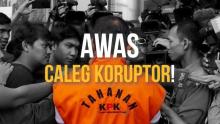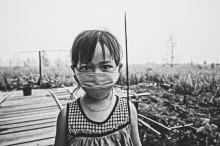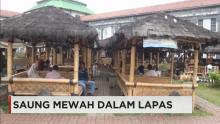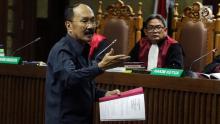The Indonesia Corruption Watch (ICW) has released a list of 46 former corruption convicts who are registered as legislative candidates of the Provincial People's Representatives Council (DPRD) and the Regional Representatives Council (DPD) for the 2019-2024 period. This list has been updated through community input, from originally 38 identified candidates, later increasing to 40, and finally to 46 candidates identified as former corruption convicts.
The National Police Headquarters has created a Joint Fact Finding Team (TGPF) for the Novel Baswedan case. However, the team consisting of representatives of diverse groups is considered political and its effectiveness is doubted.
Successive disasters have hit Indonesia. More than five major natural disasters occurred in 2018, including an earthquake, tsunami, volcanic eruption, landslide, flood, and soil liquefaction. Unfortunately, even though in the midst of disasters, corruption still occurs.
Indonesia's position surrounded by the Ring of Fire does make Indonesia prone to natural disasters. Almost every year disasters occur. In 2018, there were at least three major disasters, including the earthquake in Lombok, earthquake, tsunami, and liquefaction in Donggala, as well as the tsunami in Banten-Lampung.
The Lauder Institute of the University of Pennsylvania, USA has released the 2017 Global Think Tank Index. There are four categories of top think tanks used to create the index: Top Think Tanks in the World, Top Think Tanks by Region, Top Think Tanks by Area of Research and Top Think Tanks by Special Achievement. Top Transparency and Good Governance Think Tanks is a sub-category of Top Think Tanks by Area of Research.
The curse of natural resources is not only happening in Africa, but also Indonesia: a country with abundant natural resources, yet entangled in severe structural poverty. The chasm between the rich and poor is gaping. According to Bisnis Indonesia daily (September 24, 2016), the Gini ratio of land ownership in Indonesia in 2016 was close to 0.58, meaning that 1% of the population controls 59% of agrarian, land and spatial resources.
The Corruption Eradication Commission (KPK) officially detained former Minister of Social Affairs, Idrus Marham, on Friday (31/8). He was detained after having been named a suspect in the alleged bribery in the Riau-1 Steam Power Plant (PLTU) project, last week. Idrus was named a suspect by the KPK with the suspicion of using his influence as the Secretary General of the Golkar Party in the power plant project.
The head of the Sukamiskin Prison, Wahid Husen was arrested in a raid operation by the Corruption Eradication Commission (KPK), on Saturday, 21 July 2018. It was suspected that the head of the prison has received bribes in relation to facilities and exit permits for the prisoners.
The Corruption Eradication Commission (KPK) conducted an operation to arrest Eni Maulani Saragih, a member of the House of Representatives of the Golkar Faction and Vice Chairman of Commission VII on energy, research and technology, and environment. Eni allegedly took up to Rp 4.8 billion in bribes, in the form of commitment money to the amount of 2.5% of the value of the Riau-1 Mine Mouth Coal-Fired Electric Plant (PLTU MT) project. The investment value of this project reached US$ 900 million with planned capacity of 2 x 300 MW and commercial operation target in 2023.
Two weeks ago the judges of Jakarta Corruption Court verdicted Fredrich Yunadi, former lawyer of Setya Novanto, to 7 years in prison. In addition to the prison verdict, Fredrich is also required to pay a fine of Rp 500 million in lieu of 5 months in prison.
The Corruption Eradication Commission (KPK) arrested Governor of Aceh, Irwandi Yusuf for alleged bribery, in the Hall of the Governor of Aceh on Tuesday (3/7). From the results of the raid operation, KPK seized evidence in the form of money amounting to Rp 500 million originally provided by the Regent of Bener Meriah, Ahmadi to Irwandi Yusuf. The KPK stated that the money was part of a commitment fee amounting to 8%, which is a share for officials in the Aceh Provincial Government, of any project financed by the Special Autonomy Fund (Otsus).











